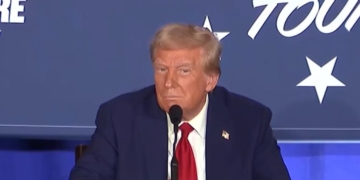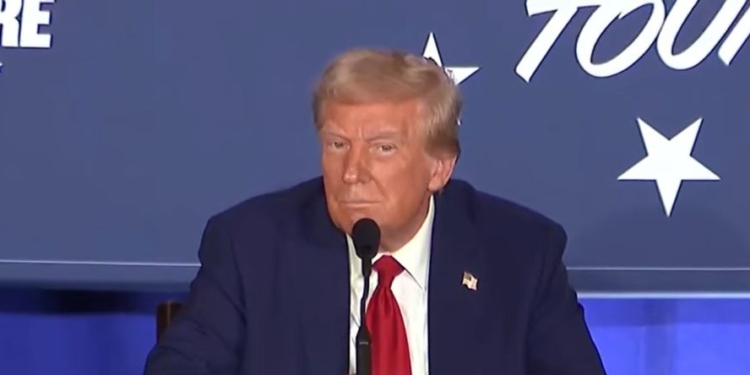The future direction of federal energy policy related to the transportation sector is a key question that will be determined in one way or another by the outcome of the presidential election. What remains unclear is the extent of change that a Trump presidency would bring.
Given that Tesla founder and CEO Elon Musk is a major supporter of former President Donald Trump, it seems unlikely a Trump White House would move to try to end the EV subsidies and tax breaks included in the Inflation Reduction Act (IRA). Those provisions, of course, constitute the “carrot” end of the Biden-Harris carrot-and-stick suite of policies designed to promote the expansion of EVs in the U.S. market.
The “stick” side of that approach comes in the form of stricter tailpipe emissions rules and higher fleet auto-mileage requirements imposed on domestic carmakers. While a Harris administration would likely seek to impose even more federal pressure through such command-and-control regulatory measures, a Trump administration would likely be more inclined to ease them.
But doing that is difficult and time-consuming and much would depend on the political will of those Trump appoints to lead the relevant agencies and departments.
Those and other coercive EV-related policies imposed during the Biden-Harris years have been designed to move the U.S. auto industry directionally to meet the administration’s stated goal of having EVs make up a third of the U.S. light duty fleet by 2030. The suite of policies does not constitute a hard mandate per se but is designed to produce a similar pre-conceived outcome.
It is the sort of heavy-handed federal effort to control markets that Trump has spoken out against throughout his first term in office and his pursuit of a second term.
A new report released this week by big energy data and analytics firm Enverus seems likely to influence prospective Trump officials to take a more favorable view of the potential for EVs to grow as a part of the domestic transportation fleet. Perhaps the most surprising bit of news in the study, conducted by Enverus subsidiary Enverus Intelligence Research (EIR), is a projection that EVs are poised to be lower-priced than their equivalent gas-powered models as soon as next year, due to falling battery costs.
“Battery costs have fallen rapidly, with 2024 cell costs dipping below $100/kWh. We predict from [2025] forward EVs will be more affordable than their traditional, internal combustible engine counterparts,” Carson Kearl, analyst at EIR, says in the release. Kearl further says that EIR expects the number of EVs on the road in the US to “exceed 40 million (20%) by 2035 and 80 million (40%) by 2040.”
The falling battery costs have been driven by a collapse in lithium prices. Somewhat ironically, that price collapse has in turn been driven by the failure of EV expansion to meet the unrealistic goal-setting mainly by western governments, including the United States. Those same cause-and-effect dynamics would most likely mean that prices for lithium, batteries and EVs would rise again if the rapid market penetration projected by EIR were to come to fruition.
In the U.S. market, the one and only certainty of all of this is that something is going to have to change, and soon. On Monday, Ford Motor Company reported it lost another $1.2 billion in its Ford Model e EV division in the 3rd quarter, bringing its accumulated loss for the first 9 months of 2024 to $3.7 billion.
Energy analyst and writer Robert Bryce points out in his Substack newsletter that that Model e loss is equivalent to the $3.7 billion profit Ford has reported this year in its Ford Blue division, which makes the company’s light duty internal combustion cars and trucks.
While Tesla is doing fine, with recovering profits and a rising stock price amid the successful launch of its CyberTruck and other new products, other pure-play EV makers in the United States are struggling to survive. Ford’s integrated peers GM and Stellantis have also struggled with the transition to more EV model-heavy fleets.
None of this is sustainable, and a recalibration of policy is in order. Next Tuesday’s election will determine which path the redirection of policy takes.
David Blackmon is an energy writer and consultant based in Texas. He spent 40 years in the oil and gas business, where he specialized in public policy and communications.
The views and opinions expressed in this commentary are those of the author and do not reflect the official position of the Daily Caller News Foundation.
(Featured Image Media Credit: Screen Capture/CSPAN)
All content created by the Daily Caller News Foundation, an independent and nonpartisan newswire service, is available without charge to any legitimate news publisher that can provide a large audience. All republished articles must include our logo, our reporter’s byline and their DCNF affiliation. For any questions about our guidelines or partnering with us, please contact [email protected].



























 Continue with Google
Continue with Google